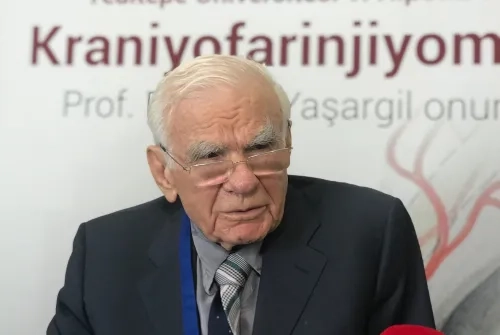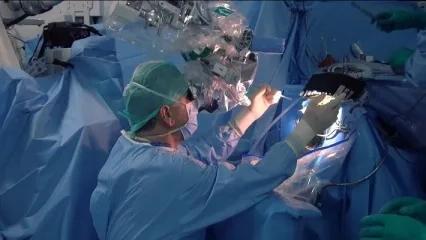Alo Yeditepe
Alo Yeditepe
Do not Fill Your Brain With Junk Food If You Want A Good Memory
Prof. Dr. Gazi Yaşargil, who has made his mark on the list of Scientists of the Century and is among the idols of the neurosurgery field all over the world, is considered a legend among his younger colleagues because he remembers all the medical details about one of his previous patients even 20-30 years ago despite his advanced age. Prof. Dr. Gazi Yaşargil said that the most important secret about his memory is to keep his brain away from junk food information. Yaşargil said, “Of course, a good memory has something to do with genetics, but it is necessary to protect the brain from junk food. Just as it is necessary to eat well to be healthy, it is necessary to keep the brain away from unnecessary information in order to keep it healthy.”
He Participated in the Symposium Organized in His Honor
Yeditepe University's 1st Pituitary Days Symposium was held in Istanbul on Saturday, October 12 with the participation of important scientists from all over the world. At the symposium held in honor of Prof. Dr. Gazi Yaşargil, who was chosen as the most important neurosurgeon of the last century and whose name is mentioned with envy by the world of medicine, the latest developments in the diagnosis and treatment of “craniopharyngiomas”, which are benign pituitary gland tumors, were explained. Speaking to Demirören News Agency, Prof. Dr. Gazi Yaşargil pointed out that the biggest part of his being still active in his profession despite being 94 years old is preserving his memory.
I Save My Memory From Unnecessary Load
Prof. Gazi Yaşargil stated, “My mother had a terrific memory, she is a mathematician. I have a particularly good memory, and so have my brothers. It is familial, but the memory must be preserved. How do we protect our bodies, how do we avoid eating junk food? The important thing is to preserve the memory if you ask me. How many types of cars there are, I have no idea. How the engine works, it's none of my business. If it works, that is enough. One of my other skills is that I do not learn the name of any streets in the cities I live in. If I know where I'm going, that's enough. So, I save my memory from the load. I don't learn anything useless. I am learning professional terms, I keep them in my mind. No junk food.”
There are Well-educated Turkish Surgeons
Emphasizing that the neurosurgeons in Turkey are at a particularly proficient level, the legendary physician said, “There are tremendous advances in equipment, especially neuroradiology, taking images, monitoring brain activity. They are in perfect condition. Then neuro anesthesia became so perfect. In my opinion, Professor (Uğur) Türe is one of the leading neurosurgeons in the world, and he deals with cases called 'inoperable'. But patience is especially important. A surgery sometimes ends in 3 hours, sometimes in 24 hours, can you guess it? You have to work millimeter by millimeter.”
New Medications Are Exciting
Prof. Dr. Gazi Yaşargil, one of the first surgeons to practice craniopharyngioma surgery half a century ago, emphasized that the most pleasing development in this field is the discovery of medications that can prevent unavoidable post-operative obesity and continued his words as follows: “They are developing new medications, for example, they said that a new medication has been developed to prevent craniopharyngioma from advancing. Of course, obesity comes from disease, in the place called the hypothalamus that manages obesity, there is the desire to eat. They eat all the time. But there is a new development, they have also found a medication against this obesity. But only for obesity caused by craniopharyngioma. Other obesity types come from undisciplined eating.”
The Way To Be A Good Surgeon Is To Educate Yourself Well
Emphasizing that being a good surgeon is about educating yourself well, Prof. Dr. Yaşargil gave the following advice to young surgeons: “I did not count them when I was in Zürich, but they somehow heard about it, someone calculated that nearly 3.000 friends came to me for education. I was in America for 20 years, and maybe a few hundred doctors came there as well. For example, you are going to a concert or going to an exhibition. There is a great soloist in the concert who plays the violin, plays the piano, and plays the flute. You listen... Do you become a good soloist then? The thing is everyone should educate themselves. Those who come to us look and get an impression. If they catch it, they develop themselves.”
This content was prepared by Yeditepe University Hospitals Medical Editorial Board.
Alo Yeditepe


